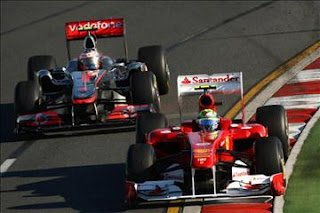 At the beginning of 2010, Bernie Ecclestone mischievously suggested that Formula One tracks should incorporate short-cuts. "It would stop people getting stuck behind others and be good for TV," explained Bernie. At the time, Jenson Button didn't seem too keen on the idea, remarking "I suppose if you are the only person who knows about [the shortcut] then it is a great idea...Bernie has a lot of very, very good ideas, and that is not one of the best."
At the beginning of 2010, Bernie Ecclestone mischievously suggested that Formula One tracks should incorporate short-cuts. "It would stop people getting stuck behind others and be good for TV," explained Bernie. At the time, Jenson Button didn't seem too keen on the idea, remarking "I suppose if you are the only person who knows about [the shortcut] then it is a great idea...Bernie has a lot of very, very good ideas, and that is not one of the best." By lap 11 of today's Australian Grand Prix, however, it seemed that Bernie's proposal must somehow have lodged deeply in Jenson's subconscious. After persistent and hitherto unsuccessful attempts to overtake Felipe Massa's obstructive Ferrari, Jenson had got alongside the Brazilian going into the fast switchback of turns 11/12. Taking the outside line into the left-hander, Jenson had the inside for turn 12, but with both cars momentarily heading for the eye-of-the-needle at high speed, Jenson bailed-out via a short-cut, and rejoined ahead of Massa.
At this point, one expected Jenson to immediately cede the place back, for the overtaking move had clearly not been completed on the racetrack. The McLaren driver, however, appeared to be in no mood to slow down and let Felipe re-pass. Perhaps sensing a means of aggravating Jenson's predicament, Massa immediately lifted off en-route to turn 13, defending briefly from Alonso, before ceding the place to his team-mate into turn 14.
The punishment meted out to Alonso for a similar pass on Kubica at Silverstone last year established a clear and recent precedent here, yet McLaren seemed intent on asking race control for an opinion rather than taking the initiative themselves. The short window of opportunity before Massa pitted a couple of laps later was squandered, and Button's race was ruined by the drive-though penalty served upon him.
McLaren team principal Martin Whitmarsh later claimed that he hadn't seen the incident at the time, a statement which reminded one of Mr Alex Ferguson's habitual claim not to have seen a foul committed within the penalty box by one of his own players.
Jenson did, of course, later pass Felipe on the track, and herein lies an interesting detail concerning the joint use of KERS and the newly instigated Drag Reduction System (DRS).
First, we need to go back to the early stages of the race. The DRS system cannot be used in the first couple of laps, but on lap 3 Button and Massa were going at it hammer and tongs, and coming out of the final corner Button duly deployed his DRS. Jenson, however, had already fully discharged his KERS during the course of the lap, and the Ferrari merely triggered its own KERS to cancel-out any potential gain by the McLaren.
At some stage over the next lap or so, Button was heard to enquire over the radio how the Ferrari could be so fast on the straight. It would be interesting to know what information the team fed back to Jenson, for by lap 7 he was saving half of his KERS charge for the exit of the final corner. Jenson was now able to deploy both the DRS and the remaining KERS charge simultaneously, yet still this wasn't sufficient to facilitate an overtaking opportunity.
When Jenson finally overtook Massa starting lap 48, the Ferrari was on worn tyres, about to pit, and this enabled him to stay closer to Felipe through the final corner. In addition, on this occasion Jenson had almost an entire lap's worth of KERS available. The McLaren duly deployed the DRS, and expended the entire KERS charge between the exit of the final corner and the timing beam, at which point a new lap's worth of KERS became available, which Jenson tapped into to complete the manoeuvre.
So, assuming that Massa used his KERS in response, and with the caveat that the DRS zone in Melbourne was perhaps not located in the ideal place, the limited conclusion we can deduce is the following:
KERS + DRS + healthy tyres > KERS + worn tyres

3 comments:
Jenson wasn't enquiring, but in fact complaining, "[cut off]... gotta stop moving on the straight like he is" [Massa].
But either way, yes, watching the KERS strategy and its punch/counter-punch application evolve throughout the race was very interesting.
Sepang, with those two long straights will be a different kettle of fish entirely I imagine.
Ah, thanks for the correction.
Yes, the kettling will be totally different in Sepang.
Have they got the 1 second DRS activation rule backwards?
When you are more than a few car lengths behind a competitor(s), this is when you need an advantage the most.
Should DRS be disallowed until you are within 1 second?
In these close confinements, let racecraft determine position.
And until you are within 1 second, use DRS as much as you want.
This by no means is a complaint to what we have currently seen this season, coming off an amazing 2010 campaign.
Post a Comment